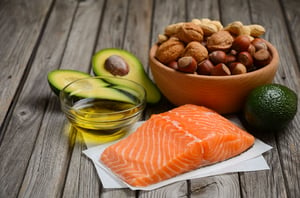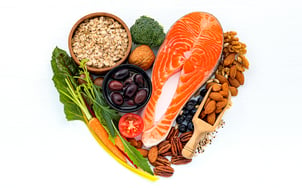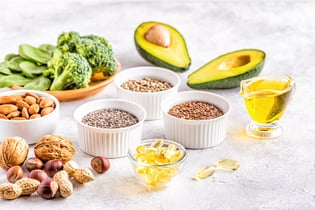Fat

The word itself conjures up strong emotions for most people. When used as an adjective, it can be seen as derogatory in nature. The term is often used as a critical comment regarding body composition or about foods that are “bad” for you. Face it, fat has a bad reputation, second only to the carbohydrate in the diet world. But the truth is, there is a lot about fat that has been misrepresented in past diet trends and in the media.
Let us clear up a common misunderstanding straight away: the fat you eat in foods is not necessarily the same as body fat. Although you can certainly increase your total body fat by eating too much, they are separate things. For the following conversation, “fat” refers to the nutrient, or macronutrient, that is one of the main building blocks of the body and a powerful source of energy. It is a required component of every cell, and needed to absorb the “fat soluble” vitamins, A, D, E, and K.
Fat provides more energy, or calories, than its fellow macronutrients, carbohydrate and protein, at 9 calories per gram. For example, if a food contains 16 grams of fat per serving, it would provide 144 calories from fat. It is because the calories per gram are higher than carbs or protein (which provide 4 calories per gram, respectively) that foods that are high in fat are villainized in relation to diet and weight loss.
Fat & Heart Disease Risk
 In years past, dietary fat was named as the primary culprit in the development of atherosclerosis (clogged arteries) and heart disease (CVD). A low-fat diet was typically prescribed for patients with high total cholesterol levels and patients with significant heart disease risk. In recent years, nutrition science has evolved, and although the total amount of fat in the diet can still play a role in the incidence of heart disease, the types of fat consumed are more effective in the treatment of high cholesterol (hyperlipidemia) and in the reduction of CVD risk.
In years past, dietary fat was named as the primary culprit in the development of atherosclerosis (clogged arteries) and heart disease (CVD). A low-fat diet was typically prescribed for patients with high total cholesterol levels and patients with significant heart disease risk. In recent years, nutrition science has evolved, and although the total amount of fat in the diet can still play a role in the incidence of heart disease, the types of fat consumed are more effective in the treatment of high cholesterol (hyperlipidemia) and in the reduction of CVD risk.
How Much vs. What Type
There is no “one size fits all” approach to prescribing macronutrient ranges. Age, medical conditions, and activity level might change how many calories from fat one should eat each day. Generally speaking, total fat intake should be between 25% and 35% of total calories. However, if you do not track the foods you eat, or total calories eaten, knowing “how much” fat to eat as a percentage of total calories might not be of benefit. If this sounds familiar, focus on what kinds of fat are in your diet.
The "Bad" Fats: Saturated & Trans Fats (Hydrogenated Fats)
Saturated fat is an artery-clogging, sticky fat that increases cholesterol in the blood and should be avoided. They are solid at room temperature; picture the thick white fat around a cut of beef or butter in a dish. Saturated fats are found in animal products including eggs, red meat, and whole dairy products. Many of our favorite cakes, cookies, and treats are prepared with and contain high levels of solid fats. Some oils (coconut and palm oil) or foods made with these oils have a higher percentage of saturated fat. These foods should be used sparingly. You can easily substitute solid saturated fats in recipes cup for cup with unsaturated oils like olive or canola or in some cases, use applesauce. Keep in mind, this might change the texture of your favorite cake or cookie, however, the saturated fat calories will be replaced with heart healthier options that can help support a lower blood cholesterol level.
Trans-fatty acids, also known simply as trans-fats, are formed during the process of hydrogenation, or changing a liquid fat to a shelf-stable solid fat. They can be found in animal fat, but in trace amounts. Americans consume most of these harmful fats in manufactured cakes, candy, cookies and in fast food. Partially hydrogenated oils, like shortening, are found in many of these products and when consumed regularly, will increase cholesterol levels and risk of heart disease. Trans-fats are not required by the body and should be limited whenever possible.
The "Good" Fats: Unsaturated: Monosaturated & Polysaturated
Unsaturated fats are liquid at room temperature. Like their oily appearance, they act as a lubricant to your arteries- allowing the larger more harmful particles from saturated and trans fats to slip away from its walls. This is a good thing. In fact, when eaten as part of a healthy diet, they do not significantly raise blood cholesterol.
 Monounsaturated fats found in avocado, almonds, peanuts, cashews and olive oil can actually help to increase the good HDL cholesterol. Calories still count so aim for no more than a serving or two of these fats throughout the day. Suggested serving sizes:
Monounsaturated fats found in avocado, almonds, peanuts, cashews and olive oil can actually help to increase the good HDL cholesterol. Calories still count so aim for no more than a serving or two of these fats throughout the day. Suggested serving sizes:
- 1/3 of chopped avocado in a smoothie or on top of a salad
- 23 almonds
- ¼ cup of unsalted or lightly salted peanuts or cashews
- 2T of olive oil added to vegetables when cooking
- 2T of natural peanut/almond/cashew butter with a piece of fruit
Polyunsaturated fats can be found in walnuts, flax seed, salmon and corn or soybean oils. They also have been shown to promote healthy total cholesterol levels when eaten in moderation. Suggested servings sizes:
- ¼ cup of walnuts
- 1-2T of flax seed added to yogurt or salad
- 3-4 oz of salmon
- 2T of corn or soybean oil used in cooking vegetables
Despite the reputation, dietary fat is an essential macronutrient and unsaturated fats (such as monounsaturated and polyunsaturated) should be included as part of a healthy diet. One to two servings per day can improve blood cholesterol levels and decrease your risk of developing CVD. Always consult with your physician before making any significant dietary changes.
Clinical Trials
Here at Chase Medical Research we often have ongoing trials for individuals with heart disease (CVD). If you are interested in participating in a heart disease trial or any one of our other trials, don't hesitate to check out our website for currently enrolling trials.
References:
- Position of the academy of nutrition and dietetics: dietary fatty acids for healthy adults. J Acad Nutr Diet. 2014 Jan; 114(1):136-53.
Share This Post
Recent Posts
- The Relationship Between Obesity and Obstructive Sleep Apnea May 19 2021
- Cardiovascular Outcome Clinical Trials May 19 2021
- Diabetic Peripheral Neuropathic Pain May 19 2021
- Are All Types of Cholesterol Bad? May 19 2021
- Blood Pressure: The Highs, the Lows, and Everything in Between May 19 2021
Categories
- Clinical Trials
- Cardiovascular Disease
- Diabetes
- Obesity
- Kidney Disease
- Hypertension
- Pain Management
- Vaccine
- Cholesterol
- Chronic Obstructive Pulmonary Disease
- Diabetic Peripheral Neuropathy
- Migraine
- Osteoarthritis
- Biologics
- COVID-19
- Gastroesophageal Reflux Disease
- Irritable Bowel Syndrome with Constipation
- Lyme Disease
- Nonalcoholic Steatohepatitis
- Respiratory Syncytial Virus


